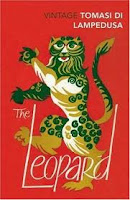 |
| Buy Paperback ($10.20) |
Archibald Colquhoun's lyrical translation also contains 70 more precious pages of Lampedusa--a memoir, a short story, and the first chapter of a novel. In "Places of My Infancy" the author warns that "the reader (who won't exist) must expect to be led meandering through a lost Earthly Paradise. If it bores him. I don't mind." Luckily, the reader does exist; even more luckily, boredom is not an option. The Leopard is a lush series of vignettes set at the birth of a united Italy beginning in the 1860s. Its author, Guiseppe di Lampedusa, is the great grandson of Sicilian Prince Don Fabrizio, also know as "The Leopard" and the main character of the novel. The novel captures the slow, sensual, sun-baked world of Sicily as characters maneuver to find love and happiness and preserve their way of life. Things move slowly and people change only reluctantly, understanding that "things must change in order to stay the same." The author uses the story to help readers place the Sicilian worldview in the context of the landscape and its history. The prince languidly discusses the coming political changes as the story moves forward. He confides his antipathy toward change to his ambitious nephew. He listens to the reasoned emotions of his faithful retainer who prefers royal generosity. He sees the opportunity for characters like the greedy mayor of the small town where his estates are located. His final decision on where to secure his place in the new regime gives the reader some insights into the politics of another time and culture. In structuring the book, the author makes interesting choices about how to organize the chronological progression of events and what to include and exclude. For me the book started slowly but built in intensity and ended with a satisfying but unconventional resolution.







